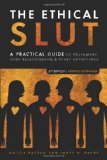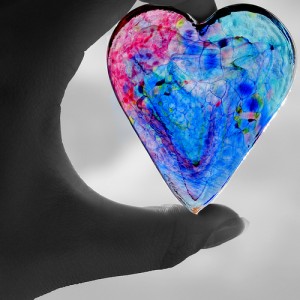I am leading a read-through of The Ethical Slut, 2nd edition. If you’d like to catch up on past installments, check the list at the bottom of the series introduction. Comments on the topics in this discussion are welcome anytime, even from people who aren’t following along in the book.
In this installment we discuss the book’s second Interlude, “Clean Love”.

In the modern world we are continuously bombarded by images of ideals, which tell us what we should look like, what we should want in love, and even how we should react to our own complex emotions. It’s all too easy to absorb these messages through the media, through the shared culture, and in our upbringing.
Clean Love is what Easton and Hardy imagine relationships might be like with all that stripped away. In a sense, it is the platonic ideal of love — not the monogamous 2.5 children white picket fence ideal, but a form where the emotion’s real shape could shine through, accepting and loving each person for who they are, not who we imagine they could be molded into or as a series of characteristics that do or do not match our fantasies of a “perfect mate” or “one true love.”
These fantasy checklists interfere with our ability to see those around us as the complex, unique individuals they are. I learned this lesson in one of the first relationships I formed after moving to Austin. That woman told me I matched every one of the characteristics on her fantasy checklist, except for one: I was too short. She told me she didn’t care — until she met a man who met all of those characteristics and was taller. She dumped me after dabbling briefly in an open relationship between the two of us.
Since then I’ve worked hard to see my lovers for who they actually are. I do my best to let each relationship find its own pace, grow in its own way, and naturally seek out its own level of involvement and entanglement in my life. Real love is messy — as the authors acknowledge themselves; in the opening to the next chapter on embracing conflict, they write about how sometimes being our most vulnerable and flawed actually helps us build intimacy with others. We all come to the table with the baggage of past relationships, and hopes and fears for this next one.

To some extent, I resist the idea that all expectations are bad things. I expect my lovers to treat me honestly, to communicate their emotions, and to try to do the things they’ll say they do, barring life’s many unexpected interferences. While I recognize that I can’t control their ability to do so, I think all of those are reasonable expectations to have of another person and in that sense they help me judge whether I am getting involved with a worthwhile person.
While I may not always be in such a golden place in my life as I am now, I have really been treasuring the way polyamory makes life simpler. Even though everyone I am dating has their fears, insecurities, moments of self-doubt or depression — as do I! — we all handle them with maturity and honesty. I guess it’s not an absolute requirement that my lovers all get along, but the fact that the people most important to me are also bonding into deeper friendship (and their own separate sexual relationship, in one case) makes my life happier and more fulfilling.
Sometimes when polyamorists encounter newbies, we like to talk about how hard all of this is, to warn them that it’s not all sunshine and three-ways. Yet with experience, with practice, as we learn what kind of people do and do not fit into our lives and in what ways, it can become easier, “cleaner,” and more satisfying.
This read-along will return on Thursday, May 18 to discuss Chapter 14, “Embracing Conflict.” In the meantime, tell me in the comments how your expectations and the kinds of relationships you seek have changed over time. Is love easier now with experience?